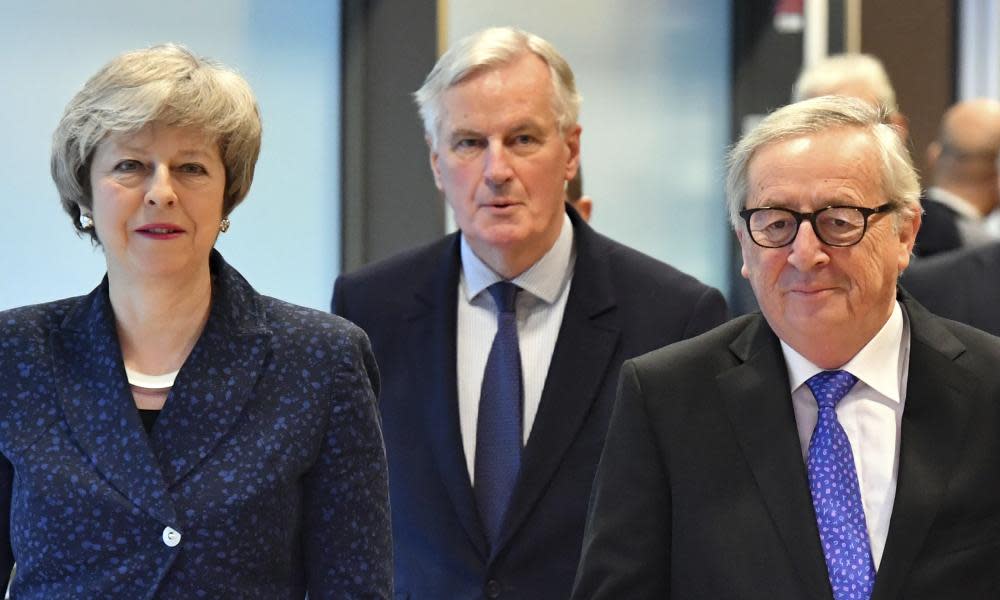Michel Barnier says there is high chance of 'accidental' no-deal Brexit

Michel Barnier has said he is more concerned than ever after a week of talks with Theresa May and the British negotiators that has left Brussels fearing an accidental no-deal Brexit in five weeks .
As the British prime minister heads to Egypt for an EU-Arab summit in Sharm el-Sheikh, the bloc’s chief negotiator publicly said he believed there remained “a chance” of ratifying the deal.
But he told a French radio channel: “Today I am more worried than before” over the talks, adding that the UK needed to make decisions fast.
The EU official also told ambassadors privately, after the negotiations with the UK’s Brexit secretary, Stephen Barclay, and a visit by May to Brussels, that the chances of an “accidental” no-deal Brexit were high.
Barnier said the UK’s attorney-general, Geoffrey Cox, was looking for a legal assurance in addition to the withdrawal agreement that could allow him to advise MPs, as the government’s chief legal adviser, that the Irish backstop would be only temporary.
Cox is examining how the legally binding paper could be worded to allow the backstop, if triggered, to be superceded by other arrangements, such as a technological fix.
The British side now privately admit that a timelimit or unilateral exit mechanism on the backstop will not be accepted by the EU.
Barnier added that May had the option of threatening the Brexiters with an extension of article 50, and a delay to the 29 March Brexit day, to win them round to her deal, EU sources said.
The Commons is expected to vote on an amendment next week on whether to force May to request an extension by mid-March if a deal is not agreed by MPs.
But with the political situation in London volatile, the EU capitals have been warned by Barnier to be ready for the UK to crash out.
“He is very concerned indeed – we are so close,” said one diplomat.
May is to meet the European council president, Donald Tusk, on Sunday in Sharm el-Sheikh, but both sides are playing down talk of a breakthrough.
“There will be no deal in the desert,” a senior EU official said. Noting that the EU already had a full agenda for the summit and that at least four EU leaders were not expected to take part: the official said: “Even if we wanted to we couldn’t, but thirdly we don’t want to.”
Ireland’s deputy prime minister, Simon Coveney, on Friday described a no-deal scenario as a “lose lose lose” option for the EU, the UK and Ireland and a “major shock for the Irish economy”.
He was commenting as the Irish government published omnibus emergency legislation on Friday on 15 areas that would be affected.
“This special law enables us to mitigate against some of the worst effects of no deal by protecting citizens’ rights, security, and facilitating extra support for vulnerable businesses and employers,” said the prime minister, Leo Varadkar.
The Irish government plans to fast-track the bill through Ireland’s parliament before Brexit day.
Coveney said his “only desire” was “to see this legislation sit on the shelf” but that it had to be pushed through in the event of no deal happening by design or accident.
He said it was extraordinary that with just 36 days to go, there was no clarity on what Britain wanted.
The Irish government has already been in talks about EU emergency funding for vulnerable businesses, especially those in the agriculture and food sector.
There is alarm over an announcement by the UK environment secretary, Michael Gove, earlier this week that tariffs would be imposed on imports to protect British farmers.
The publication of the tariff schedule has been delayed until next week but farmers could face extra taxes of up to 50% on beef exports to the UK, including Northern Ireland, and 40% on lamb.
However , it is understood that generous quotas could apply to prevent a “shock” to prices and supply of beef and other products to the UK.
The EU, which will impose tariffs at midnight on 29 March, under a no-deal scenario, has already had discussions with Ireland about emergency aid to compensate farmers for losses as a result of Brexit.
Ireland has been to keen to avoid talking publicly about how it could opt out of mandatory EU checks on animal, food and plant-based products coming in from Northern Ireland, and Coveney was pressed on why the British would agree a “backstop 2.0” in a no -deal scenario.
“That is a good question. In the context of a no-deal Brexit there are questions that will need answers,” he said.
“The method to do that would be regulatory alignment between Northern Ireland and the republic, a position that is opposed by the Democratic Unionist Party which sees any regulator divergence between Great Britain and Northern Ireland as a threat to the region’s place in the United Kingdom.”
He said there would have to be emergency talks with the UK and the government would be sticking May to her promises.
“The prime minister has come to Northern Ireland in the last few weeks and made commitments that she would do everything to ensure that we would not see return of borders of the past.”
He said it was not credible to think that “all of a sudden” the Good Friday Agreement is worth nothing because there isn’t a deal on the broader issues of Brexit.

 Yahoo News
Yahoo News 
